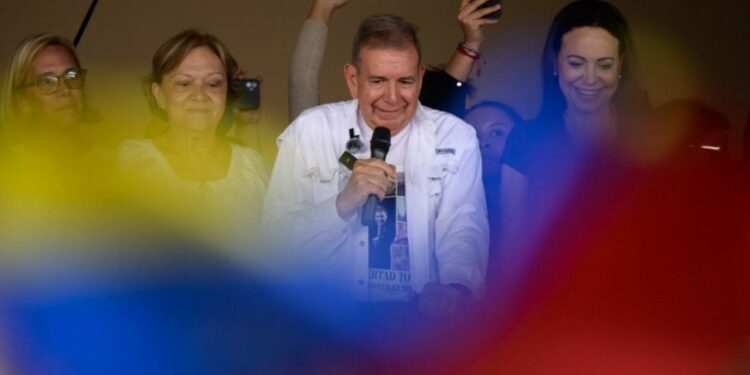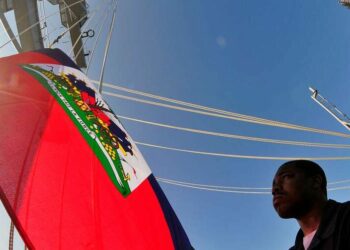Edmundo González Urrutia, a soft-spoken grandfather who spurns the spotlight, was thrust into the crosshairs of Venezuela’s iron-fisted regime when he became the last-minute opposition candidate for July 28 presidential elections.
On Sunday, the 75-year-old was forced to flee for asylum in Spain at risk of “his life” – the subject of an arrest warrant for insisting he was the rightful victor over strongman Nicolás Maduro, who has claimed a third six-year term.
González Urrutia, a retired diplomat, accepted his new role reluctantly. There was little choice.
Opposition leader María Corina Machado, who polled as Venezuela’s most popular politician by far, was disqualified from the presidential race by institutions loyal to Maduro.
Replacement candidates, too, were barred or pulled out, and in April, González Urrutia accepted a last-minute inscription as a placeholder candidate for the Plataforma Unitaria Democrática (Democratic Unity Platform, PUD) opposition coalition.
As Machado’s hopes to return to the ticket were thwarted, he went from stand-in to skipper of the opposition ship.
“I never, never, never imagined I would be in this position, but that is secondary to the challenge ahead,” the political analyst and former ambassador to Algeria and Argentina told AFP shortly after his nomination.
“This is my contribution to the democratic cause… This is my contribution to unity, to the struggle for a democratic transition.”
‘Servant of the Republic’
Unassuming González Urrutia does not have the sparkle of 56-year-old Machado, who was received like a rock star wherever she campaigned for him.
He walks slowly, expresses himself reservedly and has a slight hand tremor.
Public speaking is not his forte, and the septuagenarian tends to stick to prepared scripts delivered in a monotone voice.
He much prefers that the cameras and microphones point at the charismatic Machado, who travelled the country to beat the drum for her replacement – by car as she was banned from flying.
Both went into hiding after the election as Maduro insisted they belonged behind bars.
While González Urrutia maintained a low profile, Machado came out in public a handful of times to lead anti-Maduro protests.
Both used social media to hammer home González Urrutia’s asserted victory – with 67 percent of the ballots that were cast, according to an opposition count.
On Thursday, Machado called on the world – much of which has refused to accept Maduro’s claim to victory – to recognise González Urrutia as Venezuela’s president-elect.
Then on Sunday, she said he fled to Spain, which offered him asylum, as “his life was in danger.”
González Urrutia would continue the fight from abroad, Machado said.
‘Recovery and transition’
Described by those who know him as “decent,” “intelligent” and a “democrat,” González Urrutia is credited with building the opposition coalition into the force it is today. Quietly, behind the scenes, for the last 16 years.
Ramón Guillermo Aveledo, a former secretary of the coalition group, has described the reluctant leader as “a servant of the republic.”
González Urrutia insists he has no personal aspirations and consistently refers to Machado as “the leader of the opposition.”
One of his life’s pleasures, he said before the election, was to chat from his balcony with two of his four grandchildren who lived in a neighbouring apartment in Caracas. He also loved feeding the exotic birds that visited him there.
Then, overnight, he was thrust into the chaos of a campaign that has seen opponents to Maduro’s government sidelined, arrested, even jailed.
A small sacrifice for a greater good, he said in April: “We must all fight for Venezuela’s recovery and transition.”
‘Prepared for all scenarios’
Born and raised in La Victoria, a small city some 110 kilometres (68 miles) from Caracas, González Urrutia studied international relations at the Central University of Venezuela in the capital.
He joined the Foreign Ministry and was posted to Belgium and Washington before becoming ambassador.
He has written several books on Venezuela and is an avid reader of political texts. Samuel P Huntington’s Clash of Civilizations and Henry Kissinger’s On China are among the titles on his bookshelf at home.
On the campaign, González Urrutia had stuck to a moderate political discourse, making calls for reconciliation.
As president, he told AFP, he would work to “bring Venezuelans together [and for] the return of political exiles” followed by “the recovery of the economy and of democracy.”
But he knew full well the road there may be bumpy, under a regime that views challengers “not as adversaries, but enemies.”
by Patrick Fort, AFP
Source link : http://www.bing.com/news/apiclick.aspx?ref=FexRss&aid=&tid=66e2c53a1bff4224a97d11027d6c831b&url=https%3A%2F%2Fwww.batimes.com.ar%2Fnews%2Flatin-america%2Fvenezuelas-edmundo-gonzalez-urrutia-from-placeholder-to-opposition-pointman.phtml&c=1109807879335280121&mkt=en-us
Author :
Publish date : 2024-09-10 01:42:00
Copyright for syndicated content belongs to the linked Source.








